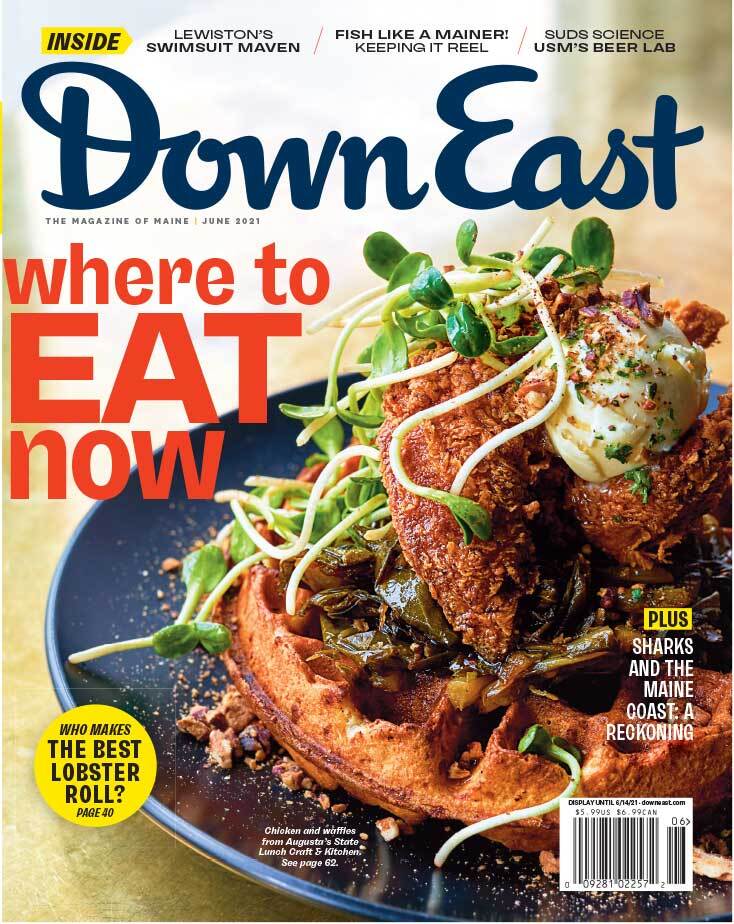By Adrienne Perron
From our June 2021 issue
Bri Dostie describes herself as an observer. It’s what makes somebody good at fly-fishing, she says, being in tune with the ecosystem around them. And in the decade-plus the 29-year-old Greene native has been observing her surroundings on Maine’s waters, one thing she can’t help noticing is the lack of diversity in the fishing community.
So, in 2019, she founded Confluence Collective, a group she hopes can challenge the homogeneity of the overwhelmingly white and male sportfishing scene, not only in Maine, but around the country. The group, led jointly by Dostie and three partners based in Minnesota, New Mexico, and Montana, aims to create “a place for every body on the water” by running consciously inclusive fishing trips and hosting forums and workshops focused on making the angling community more welcoming. Last year, fishing retail titan Orvis awarded her its Breaking Barriers Award, for those bringing new audiences to fly-fishing.
“Being ‘outdoorsy’ is really equated with whiteness in an outdoor recreation space,” she says. “We want to interrupt that and shift that. We want people to find belonging on the water and ensure that they have the agency and support that they need to discover what that looks like.”
Before the pandemic, Dostie and some of the collective’s first “community members” — anyone who participates, that is, as the group has no formal membership — organized the first of a planned series of “exchange trips,” to the fly-fishing mecca of Bozeman, Montana. Eleven women from Maine and New Hampshire spent six days tossing lines alongside a local women’s fly-fishing group while learning about regional conservation issues and examining cultural concepts of stewardship. Loaner gear, plus homestays and carpools with their hosts, helped keep the trip affordable. Confluence charged on a sliding scale, with some members volunteering to subsidize trips for those unable to pay full price. The group planned further exchanges for 2020 (including a reciprocal Montanans-to-Maine trip), open to all but geared particularly to women, people of color, LGBTQ folks, and anyone who might feel out of place at their local fly shop.
Then COVID hit, and Confluence Collective took much of its programming virtual, leading Zoom discussion sessions on race and identity on the water and “Noob Fly Tying” demos on Instagram Live. This year, Dostie hopes to reboot the exchange trips, and other plans include a partnership with Maine’s Adaptive Outdoor Education Center, with Dostie and other members helping run beginner fly-fishing workshops for novices with disabilities. In August, Confluence plans to host a campout for “outcast anglers” in western Montana, a “no judgment” trip for fishers of all backgrounds, abilities, and experience levels.
A Registered Maine Guide and former program manager at Portland’s Council on International Educational Exchange, Dostie learned to fish as a kid in the stream behind her grandparents’ house in South Paris. She fell in love with fly-fishing at 15, slinging her first flies on the Androscoggin with her now-husband, Elijah Miller, and his dad. Today, she and Miller love casting on the Rapid River, famed for its lunker brook trout, and fishing salt water near their Cape Elizabeth home.
As a white cisgendered woman leading an organization committed to diversity — and from a demographically less-than-diverse state — Dostie says she’s committed to challenging her own biases and assumptions about, among other things, who shares in the country’s fishing heritage. “Maine has a complicated past of stolen land and water, and it’s also a state where we have incredible access points for being out in nature,” she says. “My identity is wrapped up in this state, whose history is not without harm. I care about Maine, and I’m responsible for what happens here.”


